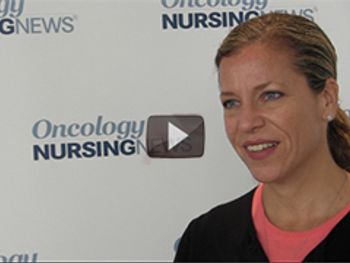
Carmela Hoefling, RN, MSN, APN-C, AOCNP, advanced practice nurse, Gastrointestinal/Hepatobiliary Oncology Program, Rutgers Cancer Institute of New Jersey, discusses the effects that malnourishment can have on surgery.

Carmela Hoefling, RN, MSN, APN-C, AOCNP, advanced practice nurse, Gastrointestinal/Hepatobiliary Oncology Program, Rutgers Cancer Institute of New Jersey, discusses the effects that malnourishment can have on surgery.

Lots of people take their work home with them, but Lynne Malestic, RN, has given the idea new meaning.
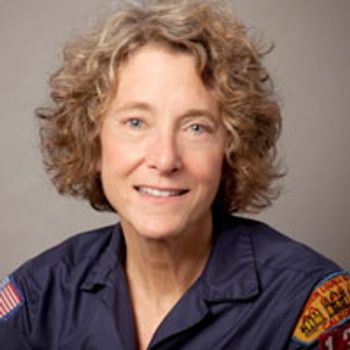
Cancer doesn’t discriminate, but that doesn’t mean the healthcare system won’t. This proves to be even more true for the lesbian, gay, bisexual and transgender community.
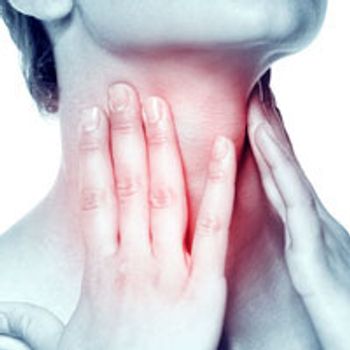
A multidisciplinary team led by oncology nurses can reduce both hospitalization and treatment breaks for patients with head and neck cancer.

When oncology nurses move proactively to learn more about and use proven effective “green-lighted” interventions like exercise and muscle relaxation in their daily practice, it can go a long way in helping patients and their caregivers manage symptoms associated with a cancer diagnosis like fatigue and anxiety.
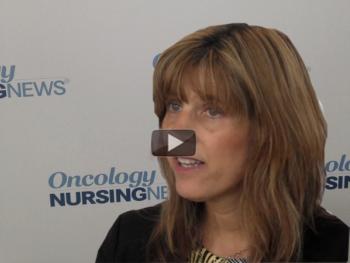
Jeannine Brant, PhD, Billings Clinic, discusses the benefits of patient-reported outcomes in cancer care.
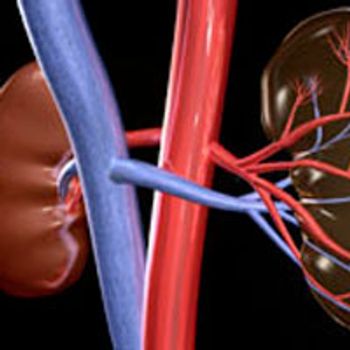
Researchers at the Rutgers Cancer Institute of New Jersey are testing the possibility of sending treatment drugs directly to the kidney in patients with upper urinary tract urothelial carcinoma in situ or small tumors in the kidney area.
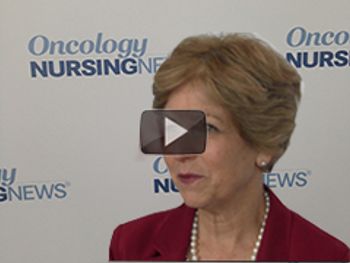
Ellyn Matthews, PhD, RN, AOCNS, CBSM, who holds the Elizabeth Stanley Cooper Endowed Chair in Oncology Nursing at the University of Arkansas for Medical Sciences, addresses common misconceptions that patients with cancer have about sleep disturbances.

A team of editors from Oncology Nursing News and CURE magazine will be in San Antonio at the 41st Annual ONS Congress covering sessions and interviewing nurses about their research of interest to oncology professionals and to the patients and survivors they tweet.

With today's approximately 14.5 million cancer survivors-a number projected to reach nearly 18 million in 2024-new survivorship models of care are needed.

A navigator-designed, proactive, weekly, telephone support call to help patients with blood cancers manage their symptoms between appointments was able to significantly reduce unplanned hospitalizations at a Colorado cancer center.

A nurse navigator–led program aimed at improving awareness, access, and uptake of low-dose CT screening for individuals at high risk of lung cancer resulted in improved screening rates with the potential to improve patient outcomes by catching the disease at its earliest stages.

With cancer treatment being delivered more in an outpatient setting, the burden of home healthcare has shifted more to family caregivers.

Oncology nurse navigators are known for identifying gaps in cancer care, being proactive in setting goals to address them, and designing specific interventions that lead not only to better-and measurable-outcomes but also to increased patient satisfaction.

Imagine a woman with a weight problem who, two weeks after chemotherapy, goes to her doctor with a urinary tract infection and a rash on her upper chest.
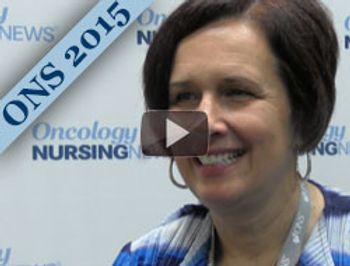
Sandra Spoelstra, PhD, RN, Assistant Professor, College of Nursing, Michigan State University, explains some of the reasons why cancer patients don't adhere to their oral medications.
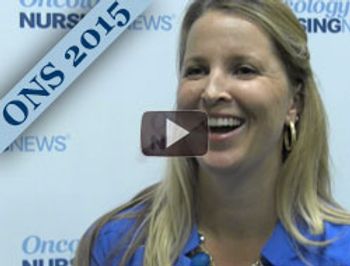
Beth Calmes, MSN, RN, oncology unit, Santa Barbara Cottage Hospital, explains what honor bathing is and how it impacts the family members of the recently deceased patient.
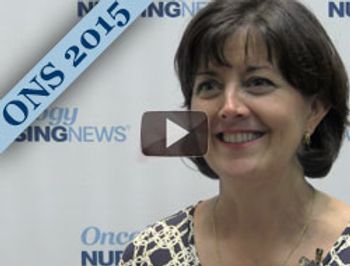
Marianne Davies, RN, MSN, ACNP, AOCN, Smilow Cancer Hospital, Yale School of Nursing, discusses how to determine which patients are eligible for immunotherapy.

The concerns a family might have when a loved one develops squamous cell carcinoma of the oral cavity might seem obvious: fear that the patient will have a shorter life due to advanced disease, empathy for her pain, and a feeling of isolation in facing a rare presentation of cancer.

Kathy Wilkinson, RN, BSN, OCN, Manager, Cancer Research, Billings Clinic Cancer Center, discusses the role that nurse's play in clinical trials.

Do social media platforms like Twitter, LinkedIn, and Facebook represent an opportunity for oncology nurses to network and keep up with the latest in evidence-based practice, or are they a time-sucking nuisance, and even worse, a possible professional landmine?
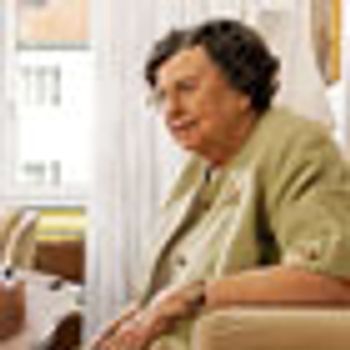
While clinical trials remain a treatment option and play a significant role in furthering cancer research in treatment, symptom management and survivorship, less than 5% of patients participate in them, and 40% of patients report that they do not understand the idea of a clinical trial.

In a moving ceremony that drew tears from many in a crowd of nearly 1000, one outstanding nurse was recognized last night with CURE magazine's 2015 Extraordinary Healer Award for Oncology Nursing.
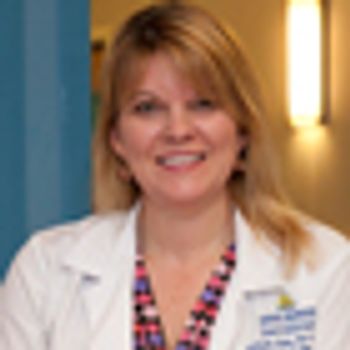
Using a color-coded, pocket-sized early warning scorecard has the potential to help nurses and other clinicians assess when cancer patients are deteriorating, and it's an intervention that could help avoid acute hospitalizations and even save lives, according to two clinical nurse specialists from Johns Hopkins who shared their experience with piloting an early warning tool.

Erica Fischer-Cartlidge MSN, CNS, CBCN, AOCNS, Clinical Nurse Specialist, Outpatient Breast Medicine Service, Memorial Sloan Kettering Cancer Center, discusses the difference between oral mucositis in patients receiving chemotherapy and patients taking an mTOR inhibitor.

Alice S. Kerber, MN, APRN, ACNS-BC, AOCN, APNG, Oncology Nurse Specialist, Georgia Center for Oncology Research and Education, explains how oncology nurses and genetic counselors will work together as the field of cancer genetics continues to grow.

Insomnia, restless leg syndrome, sleep apnea, and other sleep issues often affect quality of life in cancer patients, their caregivers, and survivors. Unfortunately, sleep complaints can often be overlooked by the medical staff or not mentioned by the patient.
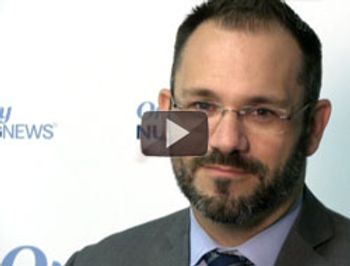
Matthew Burke, MBA, RN, MSN, APRN-BC, Oncology Nurse Practitioner/Melanoma and Renal Cell Carcinoma, Yale New Haven Hospital, discusses managing immune-mediated adverse events (IMAEs)
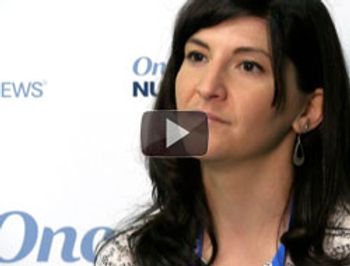
Nicole Makris, BA, Emory University, discusses the findings that analyzed the HPV vaccination habits of women who have sex with women versus women who have sex with men.

Attendees at the 2014 ONS Annual Congress were encouraged to "Get Up, Get Moving" by recommending physical activity to improve patient outcomes.